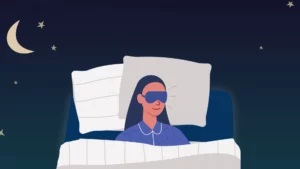Do you ever have dreams that seem so real that you can’t tell them apart from reality? For people with OCD, this is a common occurrence. In fact, some people with OCD say that their dreams are more realistic than their everyday lives. This is because obsessions often take over our dreams. In this blog post, we will discuss the link between OCD and dreams, as well as what happens when obsessions take over our sleep lives.
Contents
Defining OCD And Dreams

OCD, also known as Obsessive Compulsive Disorder, is a mental disorder that is characterized by intrusive and unwanted thoughts (obsessions) as well as repetitive behaviors (compulsions). People with OCD often have difficulty sleeping due to their constant worry and anxiety. As a result, they may experience frequent nightmares or sleep paralysis.
For people with OCD, dreams can be a way for their obsessions to take over. In fact, some studies have found that people with OCD are more likely to have dreams about their obsessions than people without OCD. This is because the content of our dreams is often based on our thoughts and worries during the day.
Connection Between The Two

So what happens when obsessions take over our dreams? For people with OCD, this can be a very distressing experience. Dreams are supposed to be a way for us to escape from reality, but for people with OCD, they can often feel like another form of their disorder.
Studies have shown that people with OCD often have difficulty differentiating between dreams and reality. This can be extremely confusing and frustrating for people with OCD, as they may not be sure what is real and what is not. This can also lead to people acting out their dreams, which can be dangerous.
Moreover, it has been a recurrent observation that people with OCD often have very vivid, intense, and real dreams. And these dreams are usually related to the person’s obsessions. For example, a person with OCD who is obsessed with germs may have a dream about being covered in dirt and germs. Or, a person with OCD who is afraid of getting sick may have a dream about being in a hospital.
This link is said to have both physiological as well as psychological basis. For example, it has been found that people with OCD often have higher levels of the stress hormone cortisol. This hormone has been linked to vivid and intense dreams. Moreover, it is also said that people with OCD tend to worry a lot during the day, which can lead to them having nightmares or sleep paralysis. Other possible explanations can also include instances such as:
- A person with OCD might have a dream about not being able to complete a task or about something going wrong and then wake up feeling compelled to do something to “fix” the situation.
- A person with OCD might have a dream in which they are doing something that goes against their morals or values and then wake up feeling guilty or concerned that they might actually do that thing in real life.
- A person with OCD might have a dream in which they are being chased or attacked and then wake up feeling scared or anxious.
- A person with OCD might have a dream about something that they are worried about during the day.
- The dream could be a way for the person to work through their anxieties and fears.
- It could also be a way for the person to come up with possible solutions to their problems.
It indeed is a very interesting thing to note that people with OCD often have dreams that are related to their obsessions. This can be both a good and a bad thing. On one hand, it shows that our dreams have a deep connection to our thoughts and worries. On the other hand, it can be very distressing for people with OCD if their dreams are constantly about their obsessions.
Consequences
Now that we know about the connection and link between OCD and dreams, let’s examine and understand the consequences of it.

- As discussed earlier, one of the main consequences is that people with OCD often have difficulty differentiating between dreams and reality. This can lead to a lot of confusion and frustration. Moreover, it can also be dangerous as people with OCD might act out their dreams.
- Another consequence is that people with OCD often have very intense and real dreams. These dreams are usually related to the person’s obsessions. This can be extremely distressing for people with OCD as they may feel like they are living in a nightmare. Moreover, it can also lead to people avoiding sleep altogether as they might be afraid of having another intense and real dream.
- This disturbance and fluctuation may also lead to other problems such as sleep paralysis, night terrors, and nightmares. People with OCD might also suffer from insomnia as they might be afraid of going to sleep and having another intense dream.
- Moreover, the lack of sleep can also lead to other problems such as fatigue, irritability, and difficulty concentrating. It is important to note that all of these consequences can have a significant impact on a person’s quality of life.It is important to seek help if you are struggling with the consequences of OCD and dreams. There are many resources available that can help you
- There is also a phenomenon known as lucid dreaming. This refers to a dream in which the person is aware that they are dreaming. People with OCD might have lucid dreams more often than people without OCD. Lucid dreaming can be both a good and a bad thing. On one hand, it can be helpful as it can allow people with OCD to work through their fears and anxieties. On the other hand, it can be extremely distressing as it can make the person feel like they are living in a nightmare.
It is important to seek help if you are struggling with the consequences of OCD and dreams. There are many resources available that can help you. You should also talk to your doctor about your experiences. They might be able to offer some helpful advice on how to manage your conditions.
Tips To Manage
Getting a good night’s sleep is one of the most crucial things you can do for your mental health. But for people with OCD, sleep is often disturbed by intrusive thoughts and obsessions. Now that we have a better understanding of the impact of OCD on dreams and subsequently the quality of sleep and rest, we will explore some tips on how to manage these issues.
Exposure and Response Prevention
The most common and effective methods is exposure and response prevention (ERP). ERP involves exposing yourself to the thoughts, images, or situations that trigger your obsessions (in a controlled setting), without engaging in the compulsions that usually follow. This allows you to practice resisting your compulsions, and eventually, the obsessions will lose their power over you.
For OCD dreams, this therapy can help you to face your fears head-on, in a safe environment. By doing this, you may find that your dreams become less intense and more manageable.
ERP can be a difficult process, but it is often very effective in treating OCD. If you think that ERP might be right for you, talk to your doctor or mental health professional about the course of treatment.
Cognitive Behavioral Therapy

Another approach that may be helpful in managing OCD is cognitive behavioral therapy (CBT). CBT focuses on changing the thoughts and behaviors that contribute to your OCD. This may include learning to challenge and reframe your intrusive thoughts, as well as developing healthy coping mechanisms for dealing with stress and anxiety.
CBT has been an effective treatment for OCD and bad dreams by helping people to understand and manage their thoughts and behaviors. If you are interested in CBT, talk to your doctor or mental health professional about finding a qualified therapist in your area.
Medication
In some cases, medication may also be necessary to manage the symptoms of OCD. There are several different types of medications that can help to treat OCD and also help with bad dreams. These include:
- Selective serotonin reuptake inhibitors (SSRIs)
- Serotonin and norepinephrine reuptake inhibitors (SNRIs)
- Tricyclic antidepressants (TCAs)
- Monoamine oxidase inhibitors (MAOIs)
- Sleep medication
Your doctor will work with you to figure out which medication is right for you, based on your symptoms and medical history.
Self Help
There are also things one can do to make the most of the situation. These are some self-help tips:

- Keep a dream journal: This can help you to track your dreams and see if there are any patterns. For example, you may notice that your dreams have certain triggers. You may work to avoid them later.
- Practice relaxation techniques: This can help you to reduce stress and anxiety, as well as improve your sleep quality. This can include a wide range of activities such as yoga, meditation, and deep breathing exercises.
- Talk to someone you trust: This can help you to process your thoughts and feelings about your dreams. It can also be helpful to talk to someone who has OCD. They may be able to offer some insight and advice. This may also help to lessen their power over you.
- Avoid alcohol and drugs before bed: These substances can not only make OCD symptoms worse but also make it more difficult to get a good night’s sleep. Avoiding or minimizing the intake of these substances can help to improve the quality of your sleep.
- Exercise regularly: Any type of physical activity is an excellent way to reduce stress and anxiety. It can also help to improve sleep quality.
- Make a comfortable and relaxing sleep environment: This can include things like reducing noise and light exposure in your bedroom, as well as making sure that your bed is comfortable.
- Reduce screentime: The blue light emitted by screens can interfere with sleep. Reducing the amount of time you spend looking at screens before bed can help to improve your sleep quality.
- Get enough sleep: This may seem difficult, but it is important to get enough rest. Getting enough sleep can help to reduce the intensity of dreams as well as improve your overall mood and energy levels.
Getting a good night’s sleep is important for everyone, but it is especially vital for those with OCD. Dreams can be a symptom of OCD, and they can also trigger OCD symptoms. If you are struggling to manage your OCD symptoms, talk to a suitable professional. With the right treatment, you can live a full and healthy life.
While there is no one-size-fits-all solution or permanent cure for managing OCD dreams, these tips may help you to feel more in control of your condition. It is possible to manage the symptoms and live a healthy and happy life. If you are struggling with OCD or bad dreams, talk to a mental health professional about your best treatment options.
Conclusion
In conclusion of the above, we can determine that OCD and dreams have an inextricably link. The content of an OCD sufferer’s dreams will often be reflective of their daytime obsessions and worries. This can lead to disturbed sleep and a negative impact on mental health. However, there are treatment options available that can help to manage the symptoms of OCD and improve the quality of sleep. If you think you might be struggling with OCD, talk to your doctor or mental health professional. They can help you get the treatment you need to live a happy and healthy life.
If you are searching for a reliable, affordable, and effective source for seeking help, reach out to Therapy Mantra. We are a team of highly professional mental health experts offering online therapy services. Contact us today to learn more about how we can help you or your loved ones. Visit our website to book an online therapy or you may also download our free OCD treatment app on Android or iOS app for more information.


